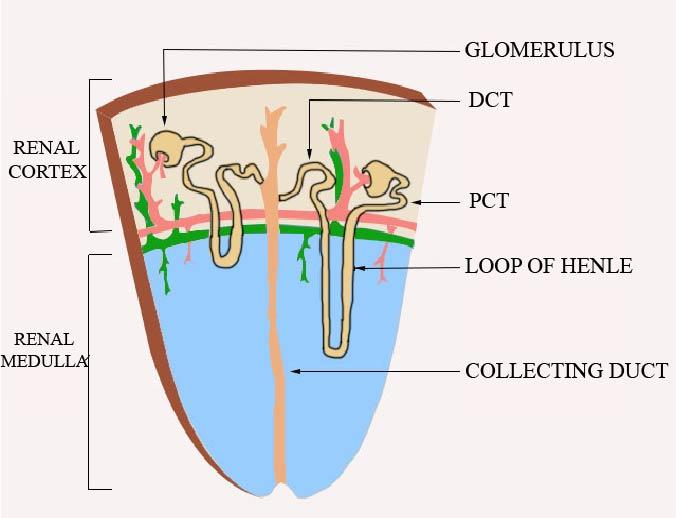
Where do ultrafiltration, reabsorption, and secretion occur in a nephron?
Answer
591.6k+ views
Hint: In the beginning of nephron, the cup shaped sack is responsible for the filtration in the kidney. Reabsorption in the kidney is performed by the ‘U’ shaped portion of the tubule which conducts urine within the nephron. Excreted waste from the kidney is passed to the urinary bladder through the tube.
Complete answer:
-Filtration
-Blood enters the kidney under pressure forcing filtrate through thin walls of glomerulus into Bowman’s capsule.
-From this filtration water, urea, glucose, acids and various salts come out as filtrate.
-Reabsorption
-Reabsorption takes place in the renal tubule or loop of Henle.
-This process returns 99% of the filtrate to the blood which contains max. amount of water by passive transport and glucose, amino acids, and most of the salts by active transport.
-Secretion
-The secretion of waste travels from glomerulus to renal tubules then to the renal pelvis, renal calyces, and finally to ureters.
-Ureters are made up of three layers: smooth muscle, fibrous tissue, and mucous layer.

Additional Information:
-Each kidney has over a million nephrons which lie in the cortex, part of the medulla.
-The nephron is divided into the following parts:
-Glomerulus
-It is a group of capillaries in a tight ball at the end of the nephron.
-This is the portion where substance filters out of the blood and enters the nephron is ‘filtrate’.
-Bowman’s capsule
-This is a cup-shaped structure that surrounds the glomerulus and receives filtrate from the blood.
-Loop of Henle or Renal tubule
-This is a long loop of the nephron surrounded by the capillaries.
-Reabsorption of certain parts of filtrate back into the bloodstream takes place here.
Note: -A rhythmic contraction of the ureter smooth muscle which helps to move the urine into the bladder is termed as peristalsis.
-Hypothalamus secretes a hormone called antidiuretic hormone responsible for the regulation of urine output.
Complete answer:
-Filtration
-Blood enters the kidney under pressure forcing filtrate through thin walls of glomerulus into Bowman’s capsule.
-From this filtration water, urea, glucose, acids and various salts come out as filtrate.
-Reabsorption
-Reabsorption takes place in the renal tubule or loop of Henle.
-This process returns 99% of the filtrate to the blood which contains max. amount of water by passive transport and glucose, amino acids, and most of the salts by active transport.
-Secretion
-The secretion of waste travels from glomerulus to renal tubules then to the renal pelvis, renal calyces, and finally to ureters.
-Ureters are made up of three layers: smooth muscle, fibrous tissue, and mucous layer.

Additional Information:
-Each kidney has over a million nephrons which lie in the cortex, part of the medulla.
-The nephron is divided into the following parts:
-Glomerulus
-It is a group of capillaries in a tight ball at the end of the nephron.
-This is the portion where substance filters out of the blood and enters the nephron is ‘filtrate’.
-Bowman’s capsule
-This is a cup-shaped structure that surrounds the glomerulus and receives filtrate from the blood.
-Loop of Henle or Renal tubule
-This is a long loop of the nephron surrounded by the capillaries.
-Reabsorption of certain parts of filtrate back into the bloodstream takes place here.
Note: -A rhythmic contraction of the ureter smooth muscle which helps to move the urine into the bladder is termed as peristalsis.
-Hypothalamus secretes a hormone called antidiuretic hormone responsible for the regulation of urine output.
Recently Updated Pages
Master Class 11 Computer Science: Engaging Questions & Answers for Success

Master Class 11 Business Studies: Engaging Questions & Answers for Success

Master Class 11 Economics: Engaging Questions & Answers for Success

Master Class 11 English: Engaging Questions & Answers for Success

Master Class 11 Maths: Engaging Questions & Answers for Success

Master Class 11 Biology: Engaging Questions & Answers for Success

Trending doubts
One Metric ton is equal to kg A 10000 B 1000 C 100 class 11 physics CBSE

There are 720 permutations of the digits 1 2 3 4 5 class 11 maths CBSE

Discuss the various forms of bacteria class 11 biology CBSE

Draw a diagram of a plant cell and label at least eight class 11 biology CBSE

State the laws of reflection of light

Explain zero factorial class 11 maths CBSE




